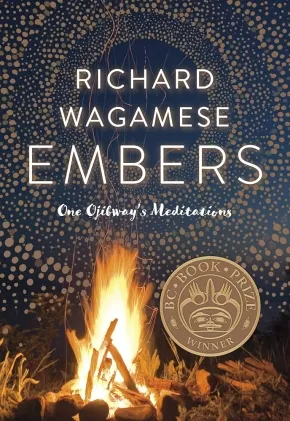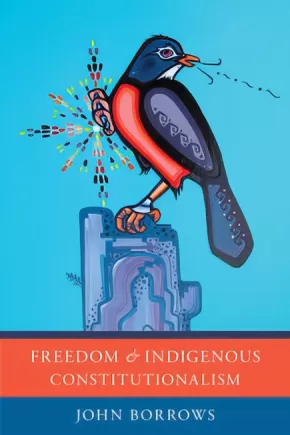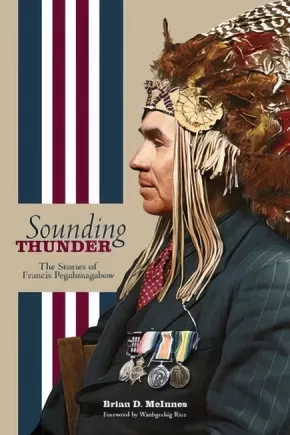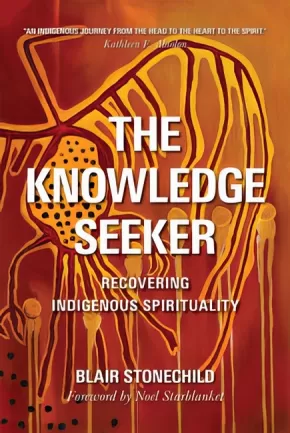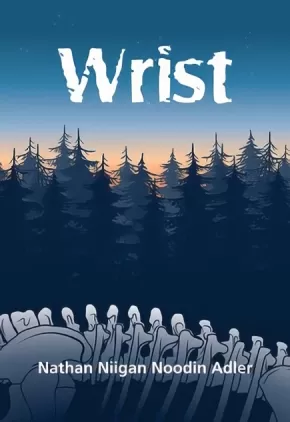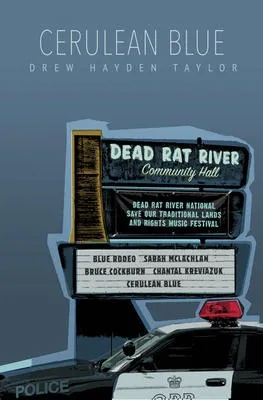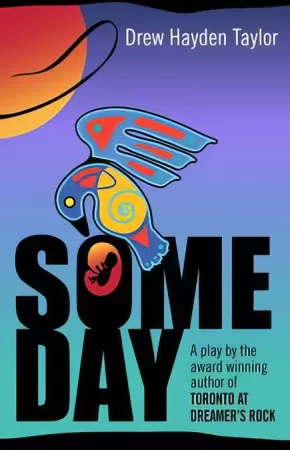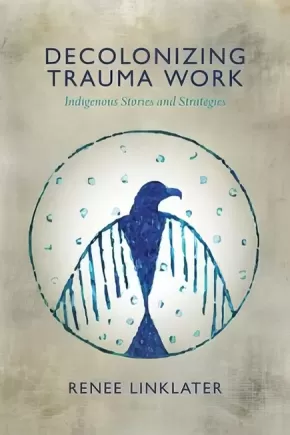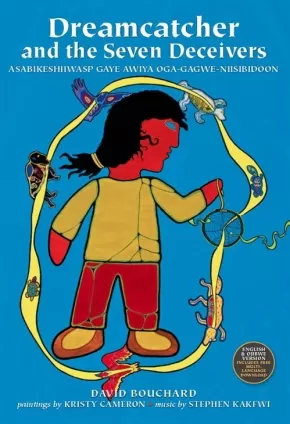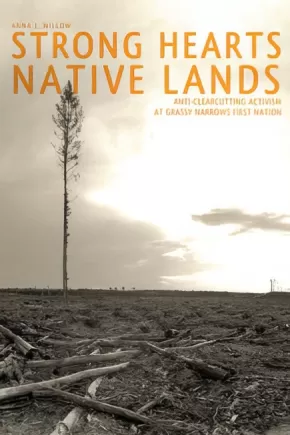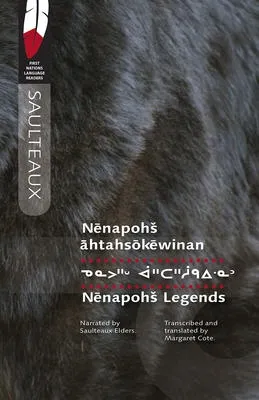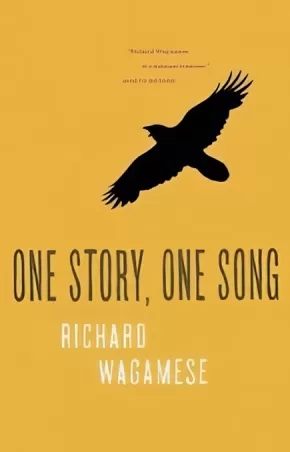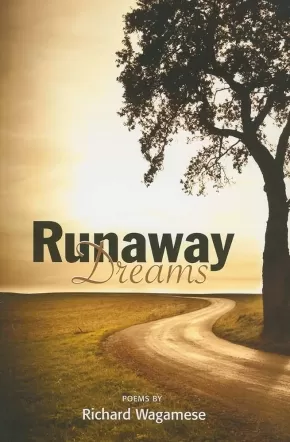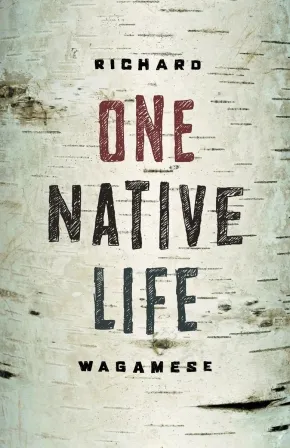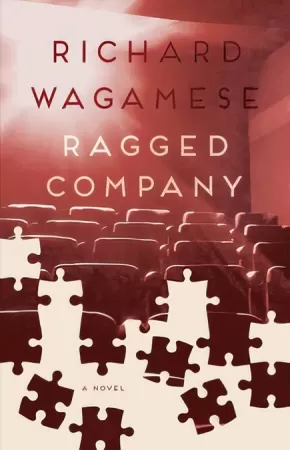
Ojibway (Ojibwe)
106
-
120
of
128 Results;
Sort By
Go To
of 9
Embers: One Ojibway's Meditations
$21.95
Format:
Paperback
Text Content Territories:
Indigenous Canadian; First Nations; Anishinaabeg; Ojibway; Wabaseemoong First Nation;
Grade Levels: 12; University/College;
ISBN / Barcode: 9781771621335
Synopsis:
Synopsis:
"Life sometimes is hard. There are challenges. There are difficulties. There is pain. As a younger man I sought to avoid them and only ever caused myself more of the same. These days I choose to face life head on--and I have become a comet. I arc across the sky of my life and the harder times are the friction that lets the worn and tired bits drop away. It's a good way to travel; eventually, I will wear away all resistance until all there is left of me is light. I can live towards that end." - Richard Wagamese, Embers
In this carefully curated selection of everyday reflections, Richard Wagamese finds lessons in both the mundane and sublime as he muses on the universe, drawing inspiration from working in the bush--sawing and cutting and stacking wood for winter as well as the smudge ceremony to bring him closer to the Creator. Embers is perhaps Richard Wagamese's most personal volume to date. Honest, evocative and articulate, he explores the various manifestations of grief, joy, recovery, beauty, gratitude, physicality and spirituality--concepts many find hard to express. But for Wagamese, spirituality is multifaceted. Within these pages, readers will find hard-won and concrete wisdom on how to feel the joy in the everyday things. Wagamese does not seek to be a teacher or guru, but these observations made along his own journey to become, as he says, "a spiritual bad-ass," make inspiring reading.
Additional Information
140 pages | 6.00" x 8.00"
Freedom and Indigenous Constitutionalism
$45.95
Format:
Paperback
Text Content Territories:
Indigenous Canadian; First Nations; Anishinaabeg; Ojibway;
Grade Levels: University/College;
ISBN / Barcode: 9781442629233
Synopsis:
Synopsis:
Indigenous traditions can be uplifting, positive, and liberating forces when they are connected to living systems of thought and practice. Problems arise when they are treated as timeless models of unchanging truth that require unwavering deference and unquestioning obedience. Freedom and Indigenous Constitutionalism celebrates the emancipatory potential of Indigenous traditions, considers their value as the basis for good laws and good lives, and critiques the failure of Canadian constitutional traditions to recognize their significance.
Demonstrating how Canada’s constitutional structures marginalize Indigenous peoples’ ability to exercise power in the real world, John Borrows uses Ojibwe law, stories, and principles to suggest alternative ways in which Indigenous peoples can work to enhance freedom. Among the stimulating issues he approaches are the democratic potential of civil disobedience, the hazards of applying originalism rather than living tree jurisprudence in the interpretation of Aboriginal and treaty rights, American legislative actions that could also animate Indigenous self-determination in Canada, and the opportunity for Indigenous governmental action to address violence against women.
Awards
- 2017 Donald Smiley Prize awarded by the Canadian Political Science Association joint winner
Reviews
"This remarkable work is at once challenging and accessible, philosophical and practical, and wide-ranging while firmly rooted in Anishinaabe tradition. Borrows takes a realistic, creative, and intellectually rigorous approach to some of the most difficult and pressing issues in Indigenous law, constitutional law, and political philosophy, as well as all readers who wish to better understand the relationship between indigenous peoples and Canada."— Katherine Starks, Saskatchewan Law Review
Additional Information
384 pages | 5.98" x 8.99"
Sounding Thunder: The Stories of Francis Pegahmagabow
$24.95
Format:
Paperback
Text Content Territories:
Indigenous Canadian; First Nations; Anishinaabeg; Ojibway;
ISBN / Barcode: 9780887558245
Synopsis:
Synopsis:
Francis Pegahmagabow (1889–1952), a member of the Ojibwe nation, was born in Shawanaga, Ontario. Enlisting at the onset of the First World War, he became the most decorated Canadian Indigenous soldier for bravery and the most accomplished sniper in North American military history. After the war, Pegahmagabow settled in Wasauksing, Ontario. He served his community as both chief and councillor and belonged to the Brotherhood of Canadian Indians, an early national Indigenous political organization. Francis proudly served a term as Supreme Chief of the National Indian Government, retiring from office in 1950.
Francis Pegahmagabow’s stories describe many parts of his life and are characterized by classic Ojibwe narrative. They reveal aspects of Francis’s Anishinaabe life and worldview. Interceding chapters by Brian McInnes provide valuable cultural, spiritual, linguistic, and historic insights that give a greater context and application for Francis’s words and world. Presented in their original Ojibwe as well as in English translation, the stories also reveal a rich and evocative relationship to the lands and waters of Georgian Bay.
In Sounding Thunder, Brian McInnes provides new perspective on Pegahmagabow and his experience through a unique synthesis of Ojibwe oral history, historical record, and Pegahmagabow family stories.
Awards
- Fred Landon Award, Ontario Historical Society (2018)
- American Book Award, Before Columbus Foundation (2017)
Reviews
“Debwemigad Nimkiig gaye Aadizookanag zhawenimaawaad. Brian McInnes has clearly been blessed by the Thunders and Great Storytellers. With Sounding Thunder he has achieved the perfect balance of personal memoir and scholarly inquiry. He shares with readers the stories that have connected one generation to another and in these cycles we find the truth about living. Dibaajimowinan omaada’oozhinang mii igo aanikoobijige.” – Margaret Ann Noodin, Assistant Professor, Department of English, University of Wisconsin
“Debwemigad Nimkiig gaye Aadizookanag zhawenimaawaad. Brian McInnes has clearly been blessed by the Thunders and Great Storytellers. With Sounding Thunder he has achieved the perfect balance of personal memoir and scholarly inquiry. He shares with readers the stories that have connected one generation to another and in these cycles we find the truth about living. Dibaajimowinan omaada’oozhinang mii igo aanikoobijige.” – Margaret Ann Noodin, Assistant Professor, Department of English, University of Wisconsin
“This uniquely intimate portrait illuminates Francis’s commitment to live in a way that reflected the spiritual values of sharing and respect for life, despite his military record of 378 enemy kills for which he became renowned.” – Allyson Stevenson, University of Guelph, Canadian Journal of History
“McInnes’ Sounding Thunder brings complexity and nuance to the story (or stories) of Francis Pegahmagabow’s life. Past authors have portrayed Pegahmagabow alternatively as a warrior, a veteran, and/or a political activist. Certainly, these depictions capture snapshots of his character. But McInnes goes much further, adding breadth and depth to the sketch of the Nishnaabe man from Georgian Bay. He has produced a high-quality piece of historical research that tells an important story of Indigenous peoples as human beings with challenges that exist both within and without the constraints of colonialism.” – Eric Story, Laurier Centre for Military, Strategic and Disarmament Studies
“Sounding Thunder is invaluable for those working in biographical, historical, Indigenous, military and political studies and the general reader. McInnes skillfully contextualizes his subject as one of Canada’s greatest war heroes as well as a member of his family, community, and Anishinaabe people.” – Brock Pitawanakwat, Assistant Professor, Department of Indigenous Studies, University of Sudbury
“Brian McInnes’ book is both elegant and masterful in its weaving of language, spirituality, storytelling, family, community, and physical place on the lands and waters of Georgian Bay as he presents the world and life of his great-grandfather, Francis Pegahmagabow. McInnes’ presentation of family stories in both Ojibwe and English, and his placement of them within their historical and geographical context, underlines Waubgeshig Rice’s claim in his foreword to Sounding Thunder that the book will remain ‘a vital resource for generations to come.’” – Jurors, Fred Landon Award, Ontario Historical Society
Educator Information
This book would be useful for social studies and history courses for students in grades 11 and 12 or at a college/university level.
This book would be useful for social studies and history courses for students in grades 11 and 12 or at a college/university level.
Additional Information
240 pages | 6.00" x 9.00" | 31 b&w illustrations | 5 b&w tables | bibliography
240 pages | 6.00" x 9.00" | 31 b&w illustrations | 5 b&w tables | bibliography
The Knowledge Seeker: Embracing Indigenous Spirituality
$32.95
Format:
Paperback
Text Content Territories:
Indigenous Canadian;
Grade Levels: University/College;
ISBN / Barcode: 9780889774179
Synopsis:
Synopsis:
The Knowledge Seeker tells the story of the developing Indigenous-run education movement and calls forth the urgent need to teach about Indigenous spirituality.
Educator Information
Table of Contents
Foreword
Acknowledgments
Introduction
CHAPTER 1: Wanting to Know
CHAPTER 2: Controlling Our Education
CHAPTER 3: The Great Principle
CHAPTER 4: The Great Law
CHAPTER 5: Once Powerful Healing
CHAPTER 6: Re-evaluating the Past
CHAPTER 7: Contemporary Crisis
CHAPTER 8: Modern Study of Spirit
CHAPTER 9: Restoring Balance
EPILOGUE: "Creator Does Not Lose His Children"
Notes
Glossary
Bibliography
Index
Additional Information
224 pages | 6.00" x 9.00"
Wrist
$19.95
Format:
Paperback
Text Content Territories:
Indigenous Canadian; First Nations; Anishinaabeg; Ojibway;
ISBN / Barcode: 9781928120056
Synopsis:
Synopsis:
An Indigenous monster story.
In 1872, dinosaur hunters become embroiled in a battle over the discovery of fossils in Northern Ontario as their excavation crews are driven mad by a bizarre and terrifying illness. Over a hundred years later, Church and his family show signs of the same monstrous affliction. As he begins to unravel his family's dark history, Church must race to protect the secrets buried deep in bones and blood. Set in the fictional town of Sterling and Ghost Lake Reserve, Wrist is Nathan Adler's debut novel.
Reviews
“A forest doesn’t know what the future holds, but it is patient.” I love how Adler solicits the assistance of the natural world in weaving his magical tale - fantastic, captivating from beginning to end. Meet the fantastic world of Adler’s people and follow their journey through Ojibway life and story. Adler peppers the story with the rhythmic sound of Ojibway and it seems to help tell the story in the same way the natural world helps tell the story.” – Lee Maracle, author of Celia’s Song
"Nathan Adler writes exceptionally well. His words weave together and tell a haunting story that leaves you wanting more." -Christine Smith (McFarlane), Freelance Journalist
"With a unique voice and narrative, Nathan Adler blends poetic imagery and Anishinaabe story to create something totally new and completely beautiful." – Cherie Dimaline, author of A Gentle Habit, The Girl Who Grew a Galaxy, and Red Rooms
Additional Information
198 pages | 5.50" x 8.50"
Cerulean Blue
$18.95
Format:
Paperback
Text Content Territories:
Indigenous Canadian;
Reading Level: N/A
ISBN / Barcode: 9780889229525
Synopsis:
Synopsis:
Cerulean Blue is a comedic play about a struggling blues band invited to participate in a benefit concert for a First Nation community in conflict with governmental authorities. Upon arriving, the band discovers the entire lineup of musical acts has cancelled and they’re left trapped behind barricades. Complicating the matter, there is conflict within the band and the sudden appearance of an old girlfriend makes the event even more perilous.
This play is an homage to fast-moving farces while also addressing Aboriginal issues. Cerulean Blue deals with relationships, perceptions, politics, and what to do when you discover you’ve been dating your first cousin. Add a few spoonfuls of original blues music, and you’ve got a fun-filled evening.
The play was written for a large ensemble cast, which makes it ideal for musical theatre departments in high schools and colleges – every student can play apart.
Cast of ten women and ten men.
Additional Information
144 pages | 7.88" x 8.47" | Paperback
Some Day
$12.95
Format:
Paperback
Text Content Territories:
Indigenous Canadian; First Nations; Anishinaabeg; Ojibway;
ISBN / Barcode: 9781927083345
Synopsis:
Synopsis:
Someday is a powerful play by award-winning playwright Drew Hayden Taylor. The story in Someday, though told through fictional characters and full of Taylor's distinctive wit and humour, is based on the real-life tragedies suffered by many Native Canadian families.
Anne Wabung's daughter was taken away by children's aid workers when the girl was only a toddler. It is Christmastime 35 years later, and Anne's yearning to see her now-grown daughter is stronger than ever.
When the family is finally reunited, however, the dreams of neither women are fulfilled.
The setting for the play is a fictional Ojibway community, but could be any reserve in Canada, where thousands of Native children were removed from their families in what is known among Native people as the "scoop-up" of the 1950s and 1960s. Someday is an entertaining, humourous, and spirited play that packs an intense emotional wallop.
Additional Information
142 pages | 5.50" x 8.50" | Paperback
Decolonizing Trauma Work: Indigenous Stories and Strategies
$27.00
Format:
Paperback
Text Content Territories:
Indigenous Canadian;
Reading Level: N/A
ISBN / Barcode: 9781552666586
Synopsis:
Synopsis:
In Decolonizing Trauma Work, Renee Linklater explores healing and wellness in Indigenous communities on Turtle Island. Drawing on a decolonizing approach, which puts the “soul wound” of colonialism at the centre, Linklater engages ten Indigenous health care practitioners in a dialogue regarding Indigenous notions of wellness and wholistic health, critiques of psychiatry and psychiatric diagnoses, and Indigenous approaches to helping people through trauma, depression and experiences of parallel and multiple realities. Through stories and strategies that are grounded in Indigenous worldviews and embedded with cultural knowledge, Linklater offers purposeful and practical methods to help individuals and communities that have experienced trauma. Decolonizing Trauma Work, one of the first books of its kind, is a resource for education and training programs, health care practitioners, healing centres, clinical services and policy initiatives.
Additional Information
176 pages | 6.00" x 9.00" | Paperback
Dreamcatcher and the Seven Deceivers
$21.95
Artists:
Format:
Hardcover
Text Content Territories:
Indigenous Canadian; First Nations; Inuit; Métis;
Grade Levels: 5;
ISBN / Barcode: 9780978432799
Synopsis:
Synopsis:
Dreamcatcher and the Seven Deceivers, the sequel to the Seven Sacred Teachings, warns of voices we can expect to hear in our dream time – voices that do not represent the Sacred Teachings.
These are the voices of Seven Deceivers who are spoken of by name. The allure of their whisperings is carefully spelled out in order that all might come to know what to listen for. Dreamcatcher and the Seven Deceivers is a carefully woven telling of how and why Creator sent Trickster to Turtle Island with a gift that would help us see the light and resist temptation. At a time before distant religions and churches came with their teachings, their commandments and their seven cardinal sins, we knew. We knew the way of the Good Red Road. We knew the right way to live; not through commandments but through Sacred Teachings – Teachings that were given to us long before their arrival. And we knew we would be tested by Seven Deceivers – what they called seven cardinal sins. We knew because we had been forewarned. And when these distant churches arrived with their teachings, their relics and their symbols, we had our own. One was the Dreamcatcher.
Rooted in humility and honesty, the creators have tried to respect the cultures and traditions of all peoples. It is our hope that this telling will unite and thus heal divisions. Prophecies tell that this is the time for One Heart, One Mind and One Drum. We, readers and authors alike, are the ones we have been waiting for. There is nobody else who can revitalize our culture and values except ourselves.
It is our hope that this telling might move readers toward greater courage and wisdom and ultimately toward achieving and understanding what is true in life’s journey.
The Seven Sacred Teachings are a link that ties all Native, Inuit and Métis communities together.
Educator Information
Available in French HERE!
Additional Information
35 pages
Strong Hearts, Native Lands (1 in Stock)
$27.95
Format:
Paperback
Text Content Territories:
Indigenous Canadian; First Nations; Anishinaabeg; Ojibway; Asubpeeschoseewagong (Grassy Narrows);
ISBN / Barcode: 9780887557392
Synopsis:
Synopsis:
In December 2002 members of the Grassy Narrows First Nation blocked a logging road to impede the movement of timber industry trucks and equipment within their traditional territory. The Grassy Narrows blockade went on to become the longest-standing protest of its type in Canadian history. The story of the blockade is a story of convergences. It takes place where cultural, political, and environmental dimensions of Indigenous activism intersect; where history combines with current challenges and future aspirations to inspire direct action. In Strong Hearts, Native Lands, Anna J. Willow demonstrates that Indigenous people decisions to take environmentally protective action cannot be understood apart from political or cultural concerns. By recounting how and why one Anishinaabe community was able to take a stand against the industrial logging that threatens their land-based subsistence and way of life, Willow offers a more complex and more constructive understanding of human-environment relationships. Grassy Narrows activists have long been part of a network of supporters that extends across North America and beyond. This book shows how the blockade realized those connections, making this community? efforts a model and inspiration for other Indigenous groups, environmentalists, and social justice advocates.
Nenapohs Legends
$19.95
Format:
Paperback
Text Content Territories:
Indigenous Canadian; First Nations; Anishinaabeg; Ojibway; Saulteaux;
Grade Levels: University/College;
ISBN / Barcode: 9780889772199
Synopsis:
Synopsis:
These seven tales are the traditional teaching stories of Nenapohs, the Saulteaux culture hero and trickster. Oral in origin, they have been passed on through generations by the traditional teachers, the Elders.
For the first time, they are published and made available in Nahkawewin or Saulteaux, the westernmost dialect of the Ojibwe language. Each story is illustrated and is presented in both Standard Roman Orthography and syllabics, with English translation. The book also includes a pronunciation guide and a Saulteaux-to-English glossary.
Educator & Series Information
Nenapohs Legends is part of the First Nations Language Readers series. With a mix of traditional and new stories, each First Nations Language Reader introduces an Indigenous language and demonstrates how each language is used today. The University of Regina Press’s long-term goal is to publish all 60+ Indigenous languages of Canada.
Additional Information
112 pages | 5.50" x 8.50" | Narrated by Saulteaux Elders, Transcribed and Translated by Margaret Cote
One Story, One Song
$19.95
Format:
Paperback
Text Content Territories:
Indigenous Canadian; First Nations; Anishinaabeg; Ojibway; Wabaseemoong First Nation;
ISBN / Barcode: 9781771620802
Synopsis:
Synopsis:
A collection of warm, wise and inspiring stories from the author of the bestselling One Native Life.
Since its publication in 2008, readers and reviewers have embraced Richard Wagamese's One Native Life. In quiet tones and luminous language,wrote the Winnipeg Free Press, Wagamese shares his hurts and joys, inviting readers to find the ways in which they are joined to him and to consider how they might be joined to others.
In this book, Richard Wagamese again invites readers to accompany him on his travels. This time, his focus is on stories: how they shape us, how they empower us, how they change our lives. Ancient and contemporary, cultural and spiritual, funny and sad, the tales are grouped according to the four Ojibway storytelling principles: balance, harmony, knowledge and intuition.
Whether the topic is learning from his grade five teacher about Martin Luther King, gleaning understanding from a wolf track, lighting a fire for the first time without matches or finding the universe in an eagle feather, these stories exhibit the warmth, wisdom and generosity that made One Native Life so popular. As always, in these pages, the land serves as Wagamese' guide. And as always, he finds that true home means not only community but conversation good, straight-hearted talk about important things. We all need to tell our stories, he says. Every voice matters.
Reviews
"One Story, One Song is a collection of short stories that show how stories shape & empower us, and change our lives. The stories are grouped according to the 4 essential principles of the Ojibway traditional teachings: humility, trust, introspection, and wisdom." - The Dalai Lama Center
Additional Information
216 pages | 5.52" x 8.50" | Paperback
Runaway Dreams (15 in Stock) - ON SALE
$12.00 $15.95
Format:
Paperback
Text Content Territories:
Indigenous Canadian; First Nations; Anishinaabeg; Ojibway;
ISBN / Barcode: 9781553801290
Synopsis:
Synopsis:
Having developed a large reputation for his many novels and nonfiction works, Richard Wagamese now appears before us as a poet, with a collection of stunning poems ranging over a broad landscape. He begins with an immersion in the immemorial landscape where “the ancient ones stand at your shoulder . . . making you a circle / containing everything.” These are Medicine teachings told from the experience of one who lived and still lives them. He describes his life on the road when he repeatedly ran away at an early age, and the beatings he received when the authorities tried “to beat the Indian right out of me.” Yet even in the most desperate situations, Wagamese shows us Canada as seen through the eyes and soul of a well-worn traveller, with his love of country, his love of people. Through it all, there are poems of love and music, the language sensuous and tender.
Additional Information
100 pages | 9.00" x 6.00"
One Native Life
$19.95
Format:
Paperback
Text Content Territories:
Indigenous Canadian; First Nations; Anishinaabeg; Ojibway; Wabaseemoong First Nation;
ISBN / Barcode: 9781553653127
Synopsis:
Synopsis:
In One Native Life, Wagamese looks back down the road he has travelled in reclaiming his identity and talks about the things he has learned as a human being, a man and an Ojibway in his fifty-two years. Whether he's writing about playing baseball, running away with the circus, attending a sacred bundle ceremony or meeting Pierre Trudeau, he tells these stories in a healing spirit. Through them, he celebrates the learning journey his life has been.
Free of rhetoric and anger despite the horrors he has faced, Wagamese’s prose resonates with a peace that has come from acceptance. Acceptance is an Aboriginal principle, and he has come to see that we are all neighbours here. One Native Life is his tribute to the people, the places and the events that have allowed him to stand in the sunshine and celebrate being alive.
Reviews
"One Native Life contains sixty-five stories that are divided into four books: Ahki (Earth), Ishskwaday (Fire),Nibi (Water), andIshpiming (Universe). From this diverse selection emerge accounts not only of disappointment and racial discrimination but also of the transformative power of love and caring." - Sean Carleton, The British Columbia Quarterly
Educator Information
Suggested Grades: 9-12
ABPBC
Grades 10-12 BC English First Peoples Resource for units on First Peoples' Story and Place-Conscious Learning.
Additional Information
272 pages | 5.63" x 8.75"
Ragged Company
$22.00
Format:
Paperback
Text Content Territories:
Indigenous Canadian;
ISBN / Barcode: 9780385256940
Synopsis:
Synopsis:
Four chronically homeless people–Amelia One Sky, Timber, Double Dick and Digger–seek refuge in a warm movie theatre when a severe Arctic Front descends on the city. During what is supposed to be a one-time event, this temporary refuge transfixes them. They fall in love with this new world, and once the weather clears, continue their trips to the cinema. On one of these outings they meet Granite, a jaded and lonely journalist who has turned his back on writing “the same story over and over again” in favour of the escapist qualities of film, and an unlikely friendship is struck.
A found cigarette package (contents: some unsmoked cigarettes, three $20 bills, and a lottery ticket) changes the fortune of this struggling set. The ragged company discovers they have won $13.5 million, but none of them can claim the money for lack of proper identification. Enlisting the help of Granite, their lives, and fortunes, become forever changed.
Ragged Company is a journey into both the future and the past. Richard Wagamese deftly explores the nature of the comforts these friends find in their ideas of “home,” as he reconnects them to their histories.
Additional Information
384 pages | 5.20" x 7.99"
Sort By
Go To
of 9

